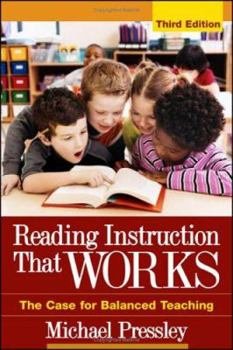Reading Instruction That Works, Third Edition: The Case for Balanced Teaching
Select Format
Select Condition 
Book Overview
This widely adopted text and K-8 practitioner resource demonstrates how successful literacy teachers combine explicit skills instruction with an emphasis on reading for meaning. Distinguished... This description may be from another edition of this product.
Format:Paperback
Language:English
ISBN:1593852282
ISBN13:9781593852283
Release Date:November 2005
Publisher:Guilford Publications
Length:469 Pages
Weight:0.35 lbs.
Dimensions:1.1" x 6.2" x 8.9"
Related Subjects
Business Business & Investing Education Education & Reference Education Theory Educational Psychology Elementary Education Health, Fitness & Dieting Health, Fitness & Dieting Instruction Methods Language Arts Language Experience Approach Lesson Planning Politics & Social Sciences Psychology Psychology & Counseling Reading Skills Research Schools & Teaching Social Sciences Textbooks Words, Language & GrammarCustomer Reviews
1 rating
An essential book for teachers of literacy
Published by Thriftbooks.com User , 25 years ago
Defining whole-language or for that matter the skills-emphasis approach to literacy has been as elusive to many in the teaching profession as the recovery of the lost ark. In Michael Pressley's newest book Reading Instruction That Works: The Case for Balanced Teaching, he makes a gallant attempt and a plea to stop the confusion and start the process of a constructivist "balanced approach" to literacy. It is a must read for any professional who desires to understand the current trends that have shaped literacy programs across the country in the last thirty years. Pressley shakes his ink-stained finger at whole-language zealots and skills-based robotrons with commendable due process as he clearly explains the foundational constructs that have developed in each "camp" over the years, and the political feuding it has caused and will likely continue over the next decade. But Pressley goes further by logically and diplomatically identifying the roots of the literacy controversy and lack of proper teacher training that stems from instructional deficits on the university level. He makes his case for a balanced approach to literacy with the idea that taking the best of both literacy philosophies will lead to an end of the squabbling and result in much more time focusing on the imperative instructional needs of children. Simple as this sounds, it is not. Frank Smith: "A word can not be recognized until its meaning has been comprehended....The first alternative is-to skip over the puzzling word. The second alternative is to guess what the unknown word might be. And the final and least preferred alternative is to sound out the word." (page 66, Reading Without Nonsense) Ken Goodman: "Reading is a psycholinguistic guessing game." (Pages 115-16, The Reading Process: Cycles and Strategies) Constance Weaver: "It's not necessary. Just as they learn patterns of oral language, so most children will unconsciously learn common phonics patterns." (Page 197, Reading Process and Practice) What do all of the whole-language princes and their queen have in common? That is a rhetorical question that requires little thought, indeed. What has been stated has resulted in a credibility problem-one that is not readily admitted nor easily abandoned by the promoters of an incomplete philosophy. On the other hand, Pressley is quick to point out with another ink-stained finger the shortcomings of a skills-emphasis approach without regard to comprehension. Reading and comprehension are two very distinct features of literacy and must be addressed as Pressley states: The skills-emphasis model...fails because the skills that are the focus of the skills-emphasis enthusiasts, especially decoding skills, are not all there is to literacy. The skills-emphasis model is an incomplete model of literacy development, one that does not even acknowledge as important many defensible whole-language practices that are emb




